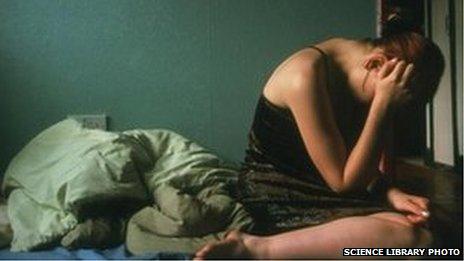Child-grooming loophole must be closed, says charity
- Published

Last year, Barnardo's worked with nearly 2,000 children who had been sexually exploited
A "legal loophole" in child grooming laws should be closed, the children's charity Barnardo's has said.
In a report published after a cross-party inquiry, it called on ministers to tighten legislation to make it easier to arrest grooming suspects.
Among its recommendations, it called for the phrase "child prostitution" to be removed from all legislation.
The Home Office said it had set up a national group to tackle grooming and had given the police new powers.
Barnardo's has been working alongside Labour MP Sarah Champion, who led the four-month inquiry, taking evidence from victims of sexual exploitation, legal experts and police officers.
Conservative and Liberal Democrat MPs and peers also sat on the child sexual exploitation panel, which looked at the problem of grooming, including online.
Unnecessary
Under the Sexual Offences Act 2003, for someone to be arrested for the offence of "meeting a child following sexual grooming", the suspect must have contacted the victim at least twice - with the intention of abusing them - before the meeting takes place.
Police officers told the inquiry this requirement was unnecessary.
Det Supt Ian Critchley, the Association of Chief Police Officers' child sexual exploitation lead, said: "It is essential that police have all the necessary powers to protect vulnerable children from the horrors of child sexual exploitation.
"When there is suspicion that a child is being groomed there is no reason why police should have to prove a second contact at all when a first can be proved."
Barnardo's said it agreed with the police evidence and called for the law to be amended.
It also suggested making it a criminal offence to breach a child abduction notice, given to a suspect to prevent contact with a child.
The report said creating an offence of breaching the notice would allow the police to intervene earlier, "rather than having to wait for a more serious offence and the associated harm to occur".
The government has said the phrase "child prostitute" should not be used, but the report said it remained in some legislation and it called on ministers to "lead the world" by removing it from the law books as soon as possible.
It said it had seen no "compelling evidence" that a specific offence of child sexual exploitation was needed.
Among other recommendations, the report suggested changing the way children learn about sexual exploitation in schools, giving specialist training to judges and lawyers, and giving more power to Local Safeguarding Children Boards - which are made up of different organisations working together to protect vulnerable children.
Ms Champion, the Labour MP for Rotherham, said: "We have set out a number of legislative suggestions that we believe will improve the way child sexual exploitation is tackled in this country. I implore the government and other relevant authorities to look closely at our recommendations."
Barnardo's said it had worked with nearly 2,000 sexually exploited children last year.
Its director of strategy, Puja Darbari, said: "We must ensure that the police and other authorities have all the necessary tools at their disposal to keep vulnerable children safe."
Crime Prevention Minister Norman Baker said child grooming was "an horrendous crime which this government is determined to stamp out".
He said a national group had been set up to prevent sexual abuse from happening, protect children online, and "ensure victims are at the heart of the criminal justice system".
Mr Baker went on: "Measures have already been introduced to reduce distress for victims and improve the investigative process for the police.
"Forces are also being given new powers to require hotels to provide information about guests they believe may be involved in the sexual exploitation of children.
"It is reassuring that this inquiry received no compelling evidence that justice cannot currently be served due to the lack of a child sexual exploitation-specific offence. We will now consider its findings and decide how they can inform the national group's ongoing work."
- Published13 January 2014
- Published17 March 2014
- Published17 October 2013